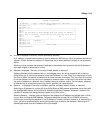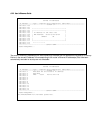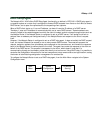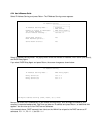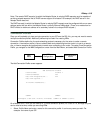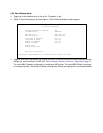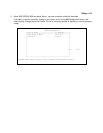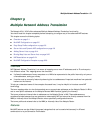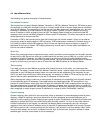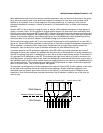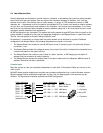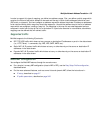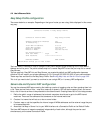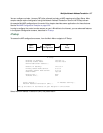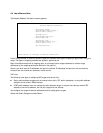
Multiple Network Address Translation 9-1
CC
CC
hh
hh
aa
aa
pp
pp
tt
tt
ee
ee
rr
rr
99
99
MM
MM
uu
uu
ll
ll
tt
tt
ii
ii
pp
pp
ll
ll
ee
ee
NN
NN
ee
ee
tt
tt
ww
ww
oo
oo
rr
rr
kk
kk
AA
AA
dd
dd
dd
dd
rr
rr
ee
ee
ss
ss
ss
ss
TT
TT
rr
rr
aa
aa
nn
nn
ss
ss
ll
ll
aa
aa
tt
tt
ii
ii
oo
oo
nn
nn
The Netopia 4541/4542 offers advanced Multiple Network Address Translation functionality.
You should read this chapter completely before attempting to configure any of the advanced NAT features.
This chapter covers the following topics:
■ Overview on page 9-1
■ MultiNAT Configuration on page 9-5
■ Easy Setup Profile configuration on page 9-6
■ Server Lists and Dynamic NAT configuration on page 9-6
■ Adding Server Lists on page 9-14
■ Binding Map Lists and Server Lists on page 9-20
■ NAT Associations on page 9-24
■ MultiNAT Configuration Example on page 9-26
Overview
NAT (Network Address Translation) is a means of mapping one or more IP addresses and/or IP service ports
into different values. This mapping serves two functions:
■ It allows the addresses of many computers on a LAN to be represented to the public Internet by only one or
a few addresses, saving you money.
■ It can be used as a security feature by obscuring the true addresses of important machines from potential
hackers on the Internet.
To help you understand some of the concepts discussed here, it may be helpful to introduce some NAT
terminology.
The term mapping refers to rules that associate one or more private addresses on the Netopia Router’s LAN to
one or more public addresses on the Netopia Routers WAN interface (typically the Internet).
The terms private and internal refer to addresses on the Netopia Router’s LAN. These addresses are
considered private because they are protected or obscured by NAT and cannot be directly accessed from the
WAN (or Internet) side of the Netopia Router unless specifically configured otherwise.
The terms public and external refer to the WAN (or Internet) side of the Netopia Router.
Features
MultiNAT features can be divided into several categories that can be used simultaneously in different
combinations on a per-Connection Profile basis.



